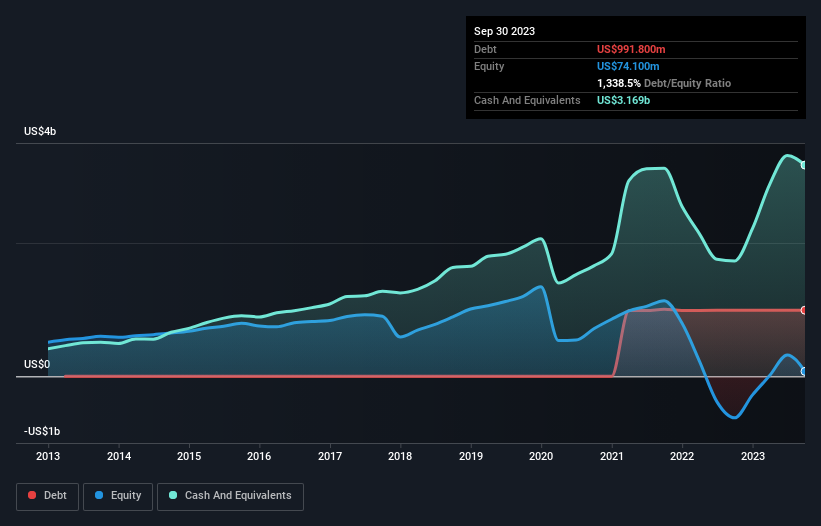
Legendary fund manager Li Lu (who Charlie Munger backed) once said, 'The biggest investment risk is not the volatility of prices, but whether you will suffer a permanent loss of capital.' So it seems the smart money knows that debt - which is usually involved in bankruptcies - is a very important factor, when you assess how risky a company is. We note that Fortinet, Inc. (NASDAQ:FTNT) does have debt on its balance sheet. But is this debt a concern to shareholders?
What Risk Does Debt Bring?
Debt and other liabilities become risky for a business when it cannot easily fulfill those obligations, either with free cash flow or by raising capital at an attractive price. In the worst case scenario, a company can go bankrupt if it cannot pay its creditors. However, a more common (but still painful) scenario is that it has to raise new equity capital at a low price, thus permanently diluting shareholders. Of course, plenty of companies use debt to fund growth, without any negative consequences. When we think about a company's use of debt, we first look at cash and debt together.
View our latest analysis for Fortinet
What Is Fortinet's Net Debt?
The chart below, which you can click on for greater detail, shows that Fortinet had US$991.8m in debt in September 2023; about the same as the year before. However, its balance sheet shows it holds US$3.17b in cash, so it actually has US$2.18b net cash.

How Healthy Is Fortinet's Balance Sheet?
According to the last reported balance sheet, Fortinet had liabilities of US$3.65b due within 12 months, and liabilities of US$3.76b due beyond 12 months. Offsetting this, it had US$3.17b in cash and US$1.01b in receivables that were due within 12 months. So it has liabilities totalling US$3.22b more than its cash and near-term receivables, combined.
Of course, Fortinet has a titanic market capitalization of US$39.0b, so these liabilities are probably manageable. However, we do think it is worth keeping an eye on its balance sheet strength, as it may change over time. While it does have liabilities worth noting, Fortinet also has more cash than debt, so we're pretty confident it can manage its debt safely.
In addition to that, we're happy to report that Fortinet has boosted its EBIT by 47%, thus reducing the spectre of future debt repayments. There's no doubt that we learn most about debt from the balance sheet. But ultimately the future profitability of the business will decide if Fortinet can strengthen its balance sheet over time. So if you want to see what the professionals think, you might find this free report on analyst profit forecasts to be interesting.
Finally, a business needs free cash flow to pay off debt; accounting profits just don't cut it. Fortinet may have net cash on the balance sheet, but it is still interesting to look at how well the business converts its earnings before interest and tax (EBIT) to free cash flow, because that will influence both its need for, and its capacity to manage debt. Over the last three years, Fortinet actually produced more free cash flow than EBIT. There's nothing better than incoming cash when it comes to staying in your lenders' good graces.
Summing Up
We could understand if investors are concerned about Fortinet's liabilities, but we can be reassured by the fact it has has net cash of US$2.18b. The cherry on top was that in converted 170% of that EBIT to free cash flow, bringing in US$2.1b. So we don't think Fortinet's use of debt is risky. Over time, share prices tend to follow earnings per share, so if you're interested in Fortinet, you may well want to click here to check an interactive graph of its earnings per share history.
At the end of the day, it's often better to focus on companies that are free from net debt. You can access our special list of such companies (all with a track record of profit growth). It's free.
New: AI Stock Screener & Alerts
Our new AI Stock Screener scans the market every day to uncover opportunities.
• Dividend Powerhouses (3%+ Yield)
• Undervalued Small Caps with Insider Buying
• High growth Tech and AI Companies
Or build your own from over 50 metrics.
Have feedback on this article? Concerned about the content? Get in touch with us directly. Alternatively, email editorial-team (at) simplywallst.com.
This article by Simply Wall St is general in nature. We provide commentary based on historical data and analyst forecasts only using an unbiased methodology and our articles are not intended to be financial advice. It does not constitute a recommendation to buy or sell any stock, and does not take account of your objectives, or your financial situation. We aim to bring you long-term focused analysis driven by fundamental data. Note that our analysis may not factor in the latest price-sensitive company announcements or qualitative material. Simply Wall St has no position in any stocks mentioned.
About NasdaqGS:FTNT
Fortinet
Provides cybersecurity and convergence of networking and security solutions worldwide.
Solid track record with excellent balance sheet.

